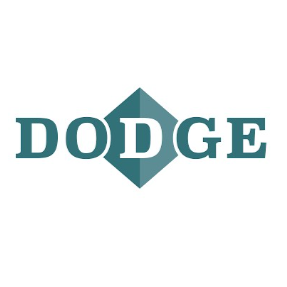Machine Tool Technology
With manufacturing giants BMW and Boeing flourishing in South Carolina and all the industries on their supply chains, our reputation as a thriving manufacturing state is rising. However, the demand for qualified machinists is much greater than the supply. In Machine Technology, students will acquire skills that translate into rewarding careers. Using state-of-the-art, industry-standard equipment, students will set up, program, and operate a variety of lathes and milling machines. Advanced students will become proficient in Computer Numerical Control (CNC) machines and can be confident that they’ve been trained through National Institute for Metalworking Skills standards.
Machine Tool Technology is part of the South Carolina Manufacturing Career Cluster. Students enrolled in this program earn two high school credits each semester and can earn a combined total of eight credits upon completing the two-year program. Credits earned will count as electives needed for the SC high school graduation requirements. One of the credits earned may fulfill the CATE/Foreign Language requirement for SC high school graduation.
If you are interested in meeting Mr. Black and taking a tour of our Machine Tool lab, we invite you to request a program tour. After-school program tours are available to prospective students and their parents in December, January, and February. We would welcome a chance to give you a tour of our programs.
Year One Courses
Classes are held in the morning and are open to 10th and 11th-grade students
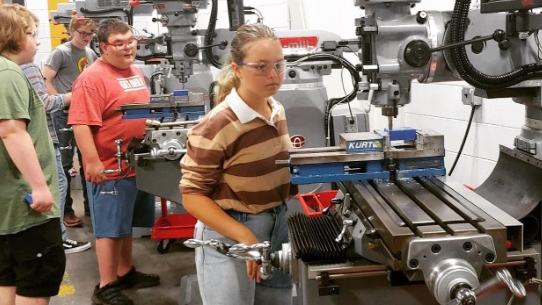
Machine Tool Technology 1
This course is designed to enable the beginning student to develop skills in the set-up and operation of all tools basic to the machinist. The student will learn to use metal-shaping equipment to make gears, tools, and machinery parts. The student learns functions and capabilities of engine lathes, drill presses, milling machines, grinders, cut-off saws, and radial drills.
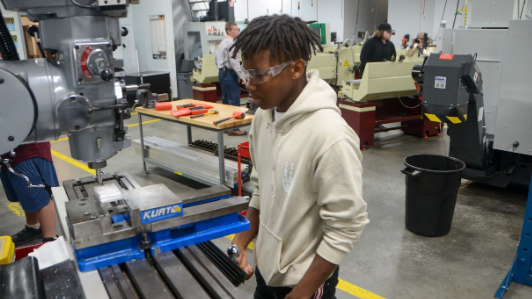
Machine Tool Technology 2
During the second semester, students will develop and refine their skills in the set-up and operation of tools basic to the machinist. Students will learn to use metal shaping equipment to make gears, tools, and machinery parts. Students learn the nomenclature functions and capabilities of engine lathes, drill presses, milling machines, grinders, cut-off saws, and radial drills. The students will create a series of projects that will demonstrate, upon completion, mastery of the machine used to make the advanced project.
Year Two Courses
Afternoon classes open to 11th and 12th-grade students who earned Machine Tool 1 & 2
Machine Tool Technology 3
This course reinforces the introductory skills and increases the intensity of training. Students participate in an advanced study of machine shop equipment and techniques. Computer-controlled milling and manufacturing processes are taught using the latest technology in the machine industry.
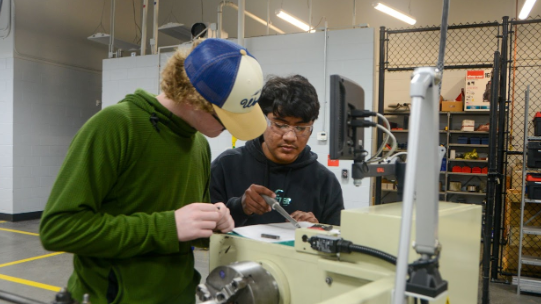
Machine Tool Technology 4
This course serves as the capstone for the Machine Tool Technology program. Students are expected to be able to apply each of the skills learned over the last three semesters across a variety of scenarios and situations. Students who excel in their program may participate in work-based learning. The WBL experience combines classroom-based education with on-the-job training experiences to help students prepare for and explore career objectives. A work-based experience must be planned and supervised by the school and employers to contribute to a student’s education and employability. Students must have access to reliable transportation.
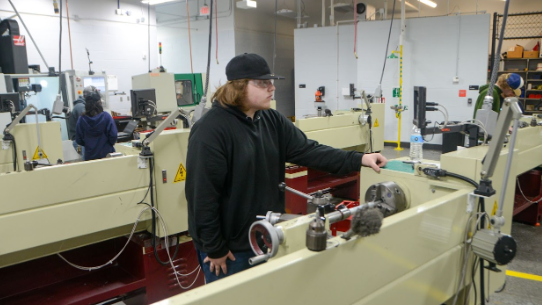
Career Opportunities
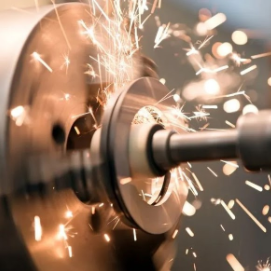
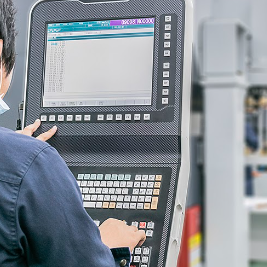
Machinist
Machinists read blueprints and make calculations. They feed material to machines, monitor and control processes, select and maintain tools, regulate temperature, ensure lubrication, and detect and troubleshoot malfunctions. Once they ensure the work accurately follows plans and blueprints, they produce the parts to order.
Salary- $42,147 per year on average, or $20.26 per hour
CNC Supervisor
A CNC supervisor presides over the manufacturing section of plants and facilities. They monitor and instruct teams of machine operators in day-to-day activities while keeping the workplace in a safe and suitable condition.
Salary - $46,144 per year on average, or $22.18 per hour
Tool & Die Maker
Tool and die makers are skilled craftsmen who combine academic knowledge with their hands-on experience and skills to set up and operate a variety of computer-controlled and mechanically controlled machine tools to produce precision metal parts, instruments, and tools.
Salary - $52,956 per year on average, or $25.46 per hour
Job Skills & Requirements
Each skill and trade requires a specific skill set to master the content and job tasks. Below are a few critical skills and requirements needed to succeed in the program and throughout a career in this field.
- Analytical: When examining machine parts and tools for quality assurance, tool and die makers use strong analytical and observation skills to assess the condition of each part they make.
- Blueprint reading: It is important to be able to read and interpret blueprints to create new products. These professionals also use blueprints to repair machines.
- Dexterity: Professionals in this trade use their dexterity skills when operating machinery, both by hand and by computer.
- Physical stamina: These professionals spend much of their workday on their feet, so it's important that they have a high level of physical stamina. Tool and die makers also need physical strength to operate machinery and lift heavy objects.
- Welding: After they create machine parts and tools, welding may be needed to combine parts together to complete the final assembly and correct any error in their design.
Available Certification Opportunities
(Click logos below for more information)
Local Work-Based Learning Partners
(Click logos below to visit our partners)
NOTE: Credits earned will count as electives needed for the SC high school graduation requirements. One of the credits earned may fulfill the CATE/Foreign Language requirement for SC high school graduation. Most 4-year colleges will NOT accept career center courses as a substitute for the foreign language college admissions requirement.


